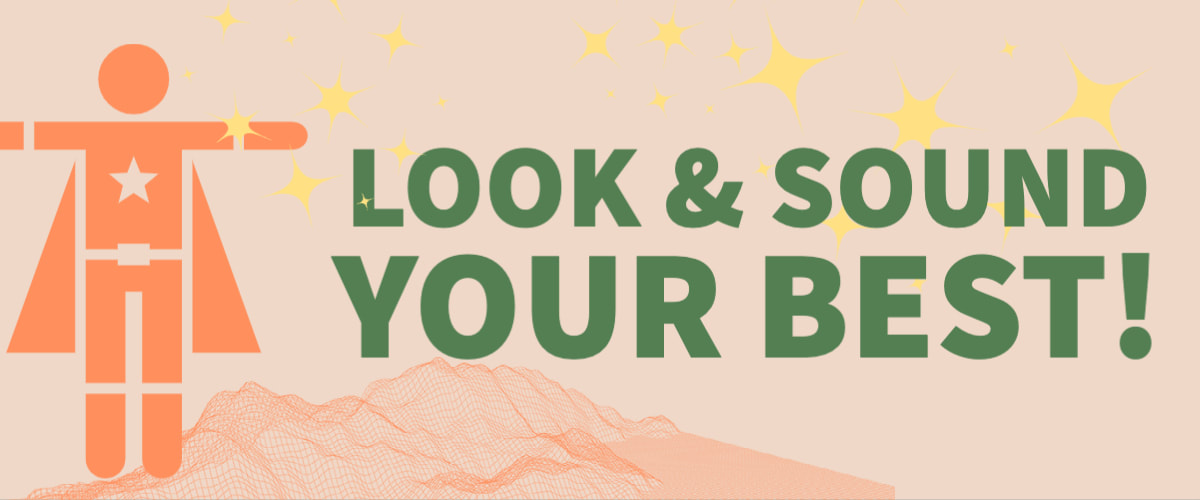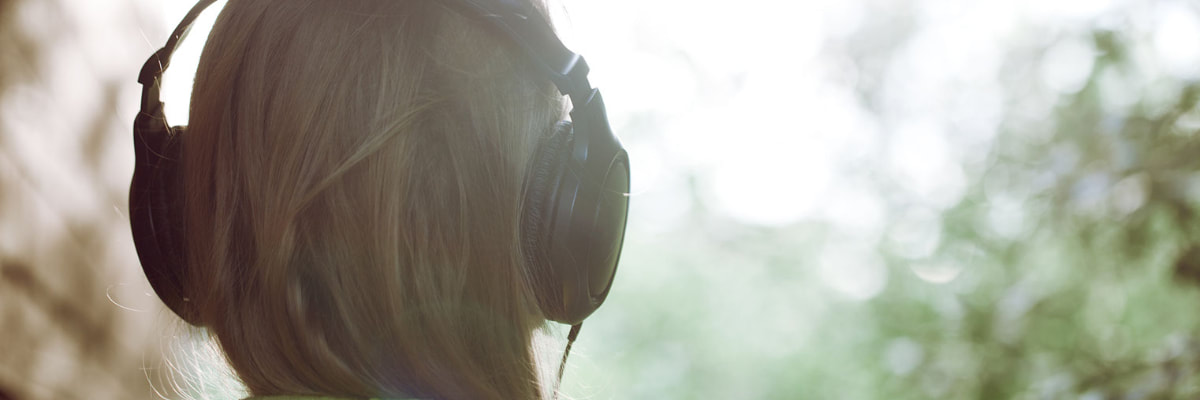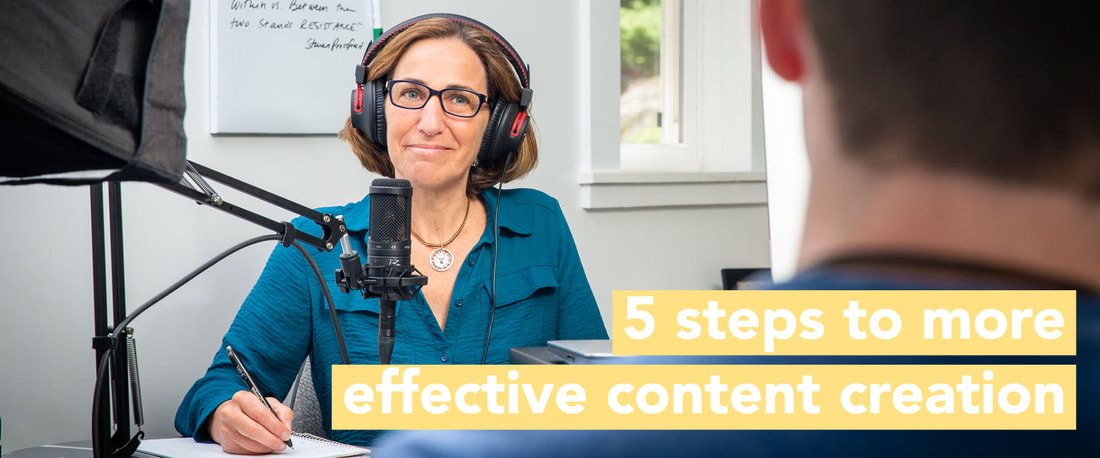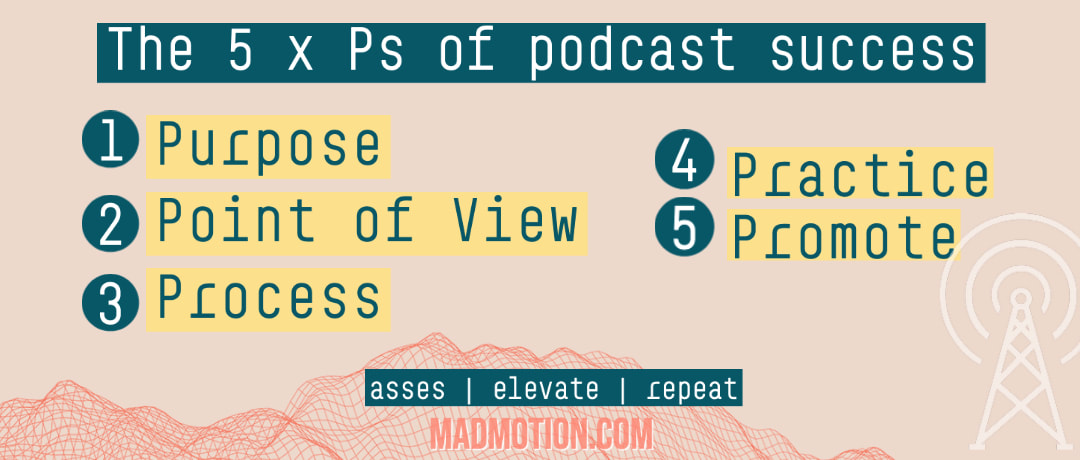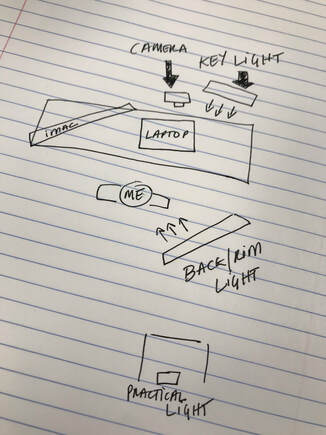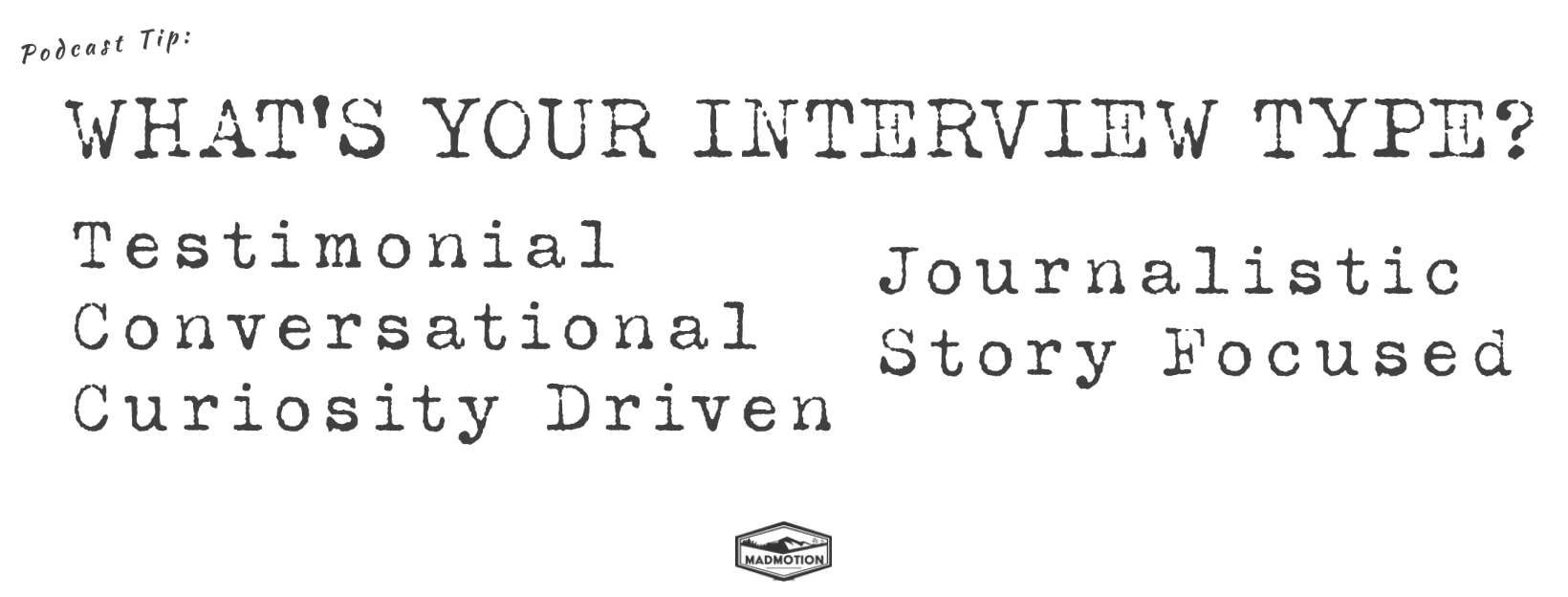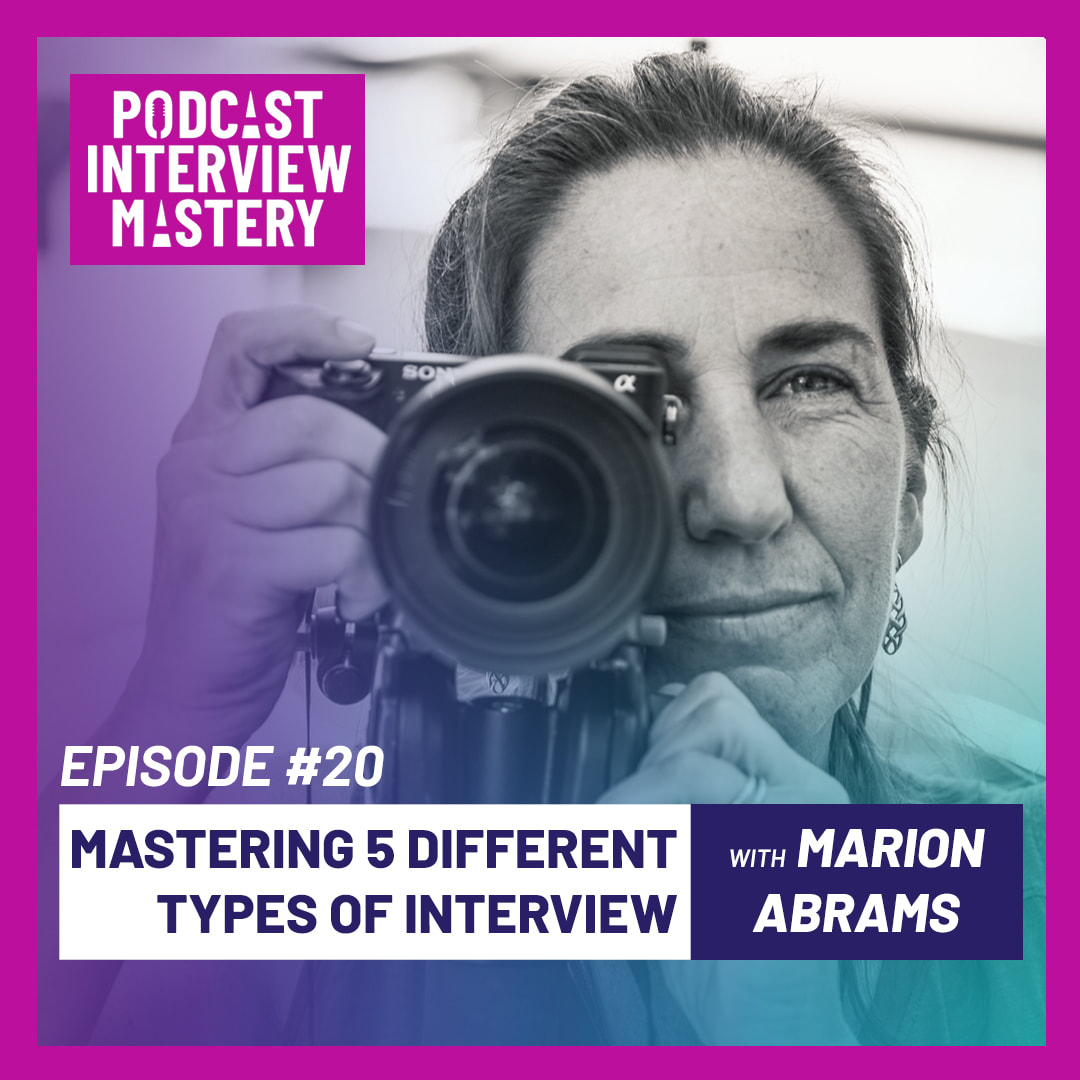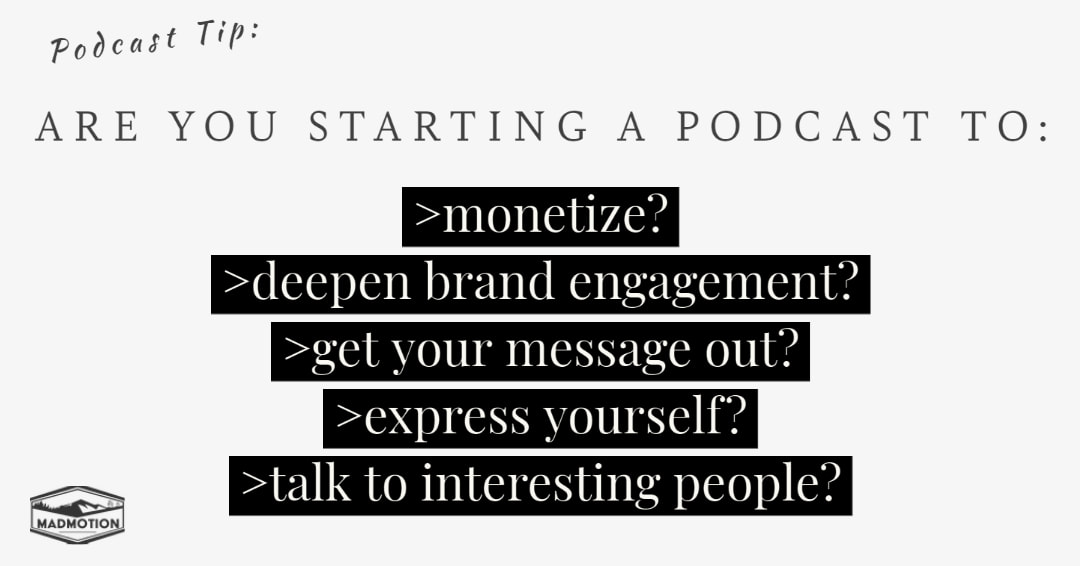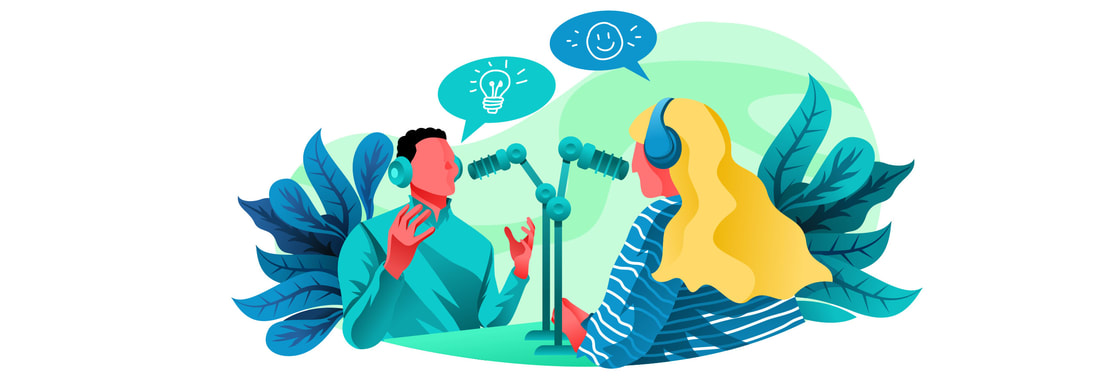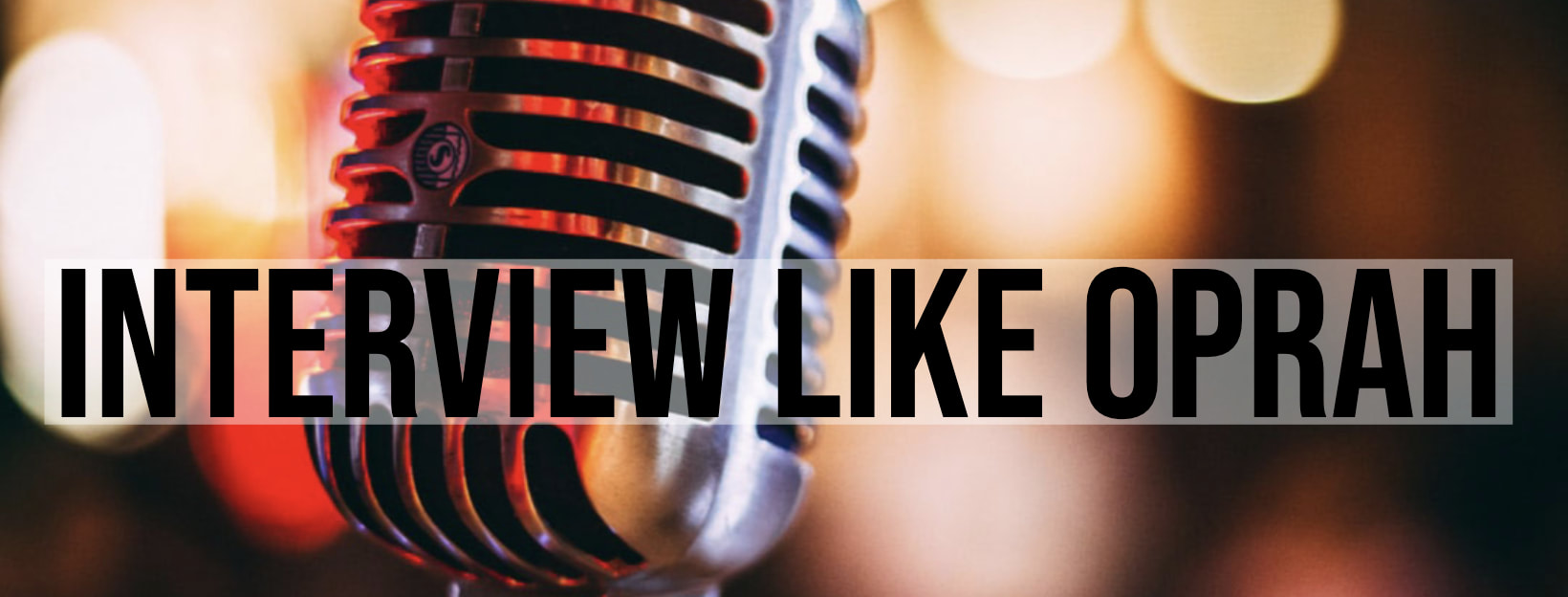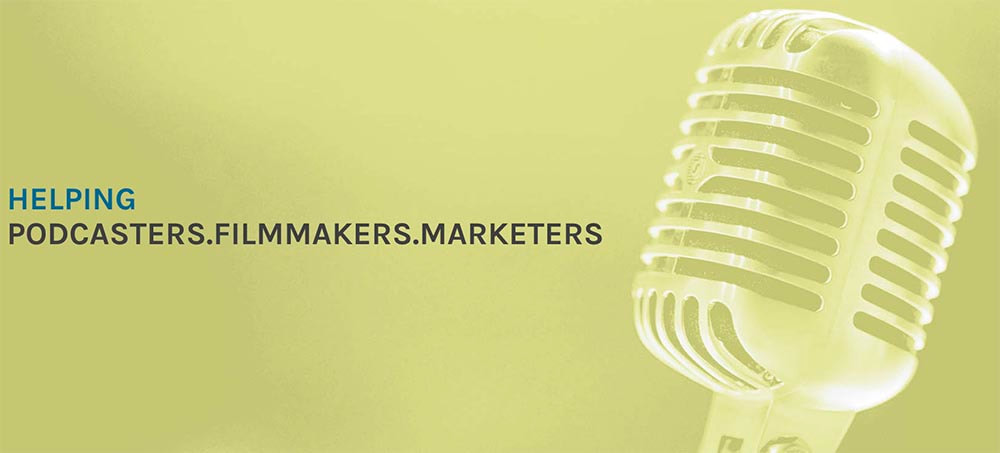|
What you say as a podcast or livestream guest is the most important thing, and how you say it comes next. But that should all sit on a firm foundation of good audio and video quality. Here are a couple of tips to look and sound like a professional when you are invited to guest on a podcast, video or livestream. Sound Good:1 . Find a quiet space where you won't be interrupted by friendly people, loud sirens, vacuum cleaners or snoring dogs. 2. You will sound better with a microphone, here are a few options: - A versatile inexpensive (about $70) but good sounding mic is the Samson Q2U. It comes with a USB cable that will plug right into your computer, a very basic stand, a windscreen and an XLR cable in case you work with a pro recording device. - If you only have a USB c connector try the AKG Lyra (it sounds good and it’s stylish too!) - If you prefer a clip on lavalier style mic this is one with a USBc connection try the Sennheiser Pro XS Lav. - And if you are looking to level up but still connect directly to your computer with a USB cable (no techy interface device needed) try the Shure Mv7. It costs about $250, but take note you will also need to buy a desktop mic stand or boom arm with this one. 3. Consider headphones, especially if video isn't being recorded. Sometimes the sound from the interviewer playing on your speakers will feed back into the microphone creating strange echos. Wearing headphones will prevent that. Once the mic is hooked up here are some hints to make sure it's set up properly. AND here's a quick video on mic technique, this can have a huge impact on the sound of your interview and costs you nothing! Look Good:First take a look at what's behind you that will be visible in the shot. If it’s a bright window see if you can turn your set up around so you face toward the window letting that natural light hit your face. After that the simplest way to make the image look better is to add a small light. - This model from Lume Cube that attaches right to your monitor or laptop with it's own suction cup. - If you decide to go with a ring light remember - ring lights were designed to go AROUND the camera to create an even flattering light. If you don't use it that way then it's just a round light, nothing special. - If you want a versatile and more permanent solution, I love these desk lights from Lume Cube. When you are not recording, they look and function like a modern style desk lamp, but they rotate and create a flattering soft light for your virtual recordings. Check the Connection:And finally - don't forget to check the internet connection and make sure it's stable and fast enough to carry the signal. Ookla Speed test is a useful tool for that.
If you have a podcast and you want more reviews - make it as easy as you can for your listeners. Unfortunately it's not easy to find the "write a review" button in the apple podcast app from your phone, but once you do the rest is easy. Consider making a video like this (or feel free to steal mine) or posting the steps to your website or social media (I have them below if you'd like to steal them feel free!) - Whatever it is you want your listeners to do more of, think about how you can make it as easy as possible for them. Here are the steps to leave a podcast review on the apple podcast app from your phone:
1. Open the apple podcasts app 2. Enter the name of the podcast you want to review in the apps search bar 3. Click on the show 4. Scroll down through the list of episodes to the "ratings and reviews" section 5. Just below it you'll see the words "leave a review" - click on that 6. Pick a number of starts, enter a headline and write your review 7. Click "send" at the top right.
Is your content creating measurable results for your business? It should be. In this episode of Grounded Content podcast I go through a 5 step process you can use to get the tangible results you are looking for from your podcast, emails, youtube channel or social media.
Do you have a podcast? Could it do more for you?
So many people and businesses start a podcast and then stall, in fact of the 2 million podcasts out there today only about 750,000 have published an episode in the last 90 days. Sometimes you just need a fresh look at things. You can use this tool over and over again to define, refine and achieve your podcasting goals. 5 steps to asses, strategize, and elevate. 1. PURPOSE: What do you want your podcast to do for you? Attract sponsors, express your message, serve your community, build authority, have deep discussions, research your market, practice public speaking? Know that and you can start to do the equation and decide how to invest in success. 2. POINT OF VIEW: What makes you stand out? What makes you you? There may be 10, 20 or 100 podcasts on your subject, but none will be like yours. Don't copy everyone else, I can help you understand your unique point of view. 3. PROCESS: Now that you know 1 & 2 we can develop your processes - do you edit or hire an editor, how do you structure your show, how do you design your publications schedule, who are your guests (if you have guests), how do they get booked, who writes copy and creates artwork, how do you design the best titles, how do you understand your podcast data and much more. There are hundreds of tools and tactics for podcasters, but you need to use the right ones in the right ways. 4. PRACTICE: Like everything in life it's a cycle of continuous improvement. Get better, then get even better, that's how you become great. 5. PROMOTE: You may have the most incredible podcast, but If you don't promote it how will anyone know. There are things that really do work - paid and organic strategies - to make sure you reach the right people. Once you have the first 4 steps in place, we can build a strategic promotion plan. I help podcasters like you. You're putting in the work, but are you getting the results you want from your show? You have the potential, that's why you started. What if you didn't have to learn it all the hard way?
The single most important driver of a successful recorded interview is an understanding of your goals as an interviewer. To begin, it helps to recognize that there are five types of interviews. We've defined them as the 5 interview lessons interview types:
In a testimonial style interview, the goal is to record a client or customer expressing satisfaction with your services or product. Most often your interview subject is not used to being on camera. The challenge is to get the exact content you're looking for while making sure it feels comfortable and natural. Conversational These are most often heard in podcasts or talk shows. In the conversational interview, the audience is as interested in hearing the guest as they are the host. The challenge here is to build rapport, to think on your feet, and keep a good sense of balance between remarks, questions, and follow-ups. Curiosity Driven In this style interview, the goal is discovery. You don't know where the interview will lead and are only interested in following the natural flow of discovery. For this, the most important skill is deep listening and curiosity. Journalistic The journalistic or documentary interview is one in which you don't already know the answers, but you do know exactly what you hope to learn. For this interview, you will want to have a solid outline and strategy in place before you begin. You may need to pause and check your notes to be sure you and your guest stay on track. For this style of interview, the biggest challenge is to keep the guest on track and make sure you get the information you are looking for on tape. Story Focused In a story-focused interview, your guest has a story to tell. Most likely something they have achieved or endured. Your job is to facilitate the telling of a rich full tale. You are the guide to help elicit detail, fill in gaps, and keep the story moving. Tactics For each style interview, your tactics will differ. No matter what style (or combination of styles) you use, before you approach your guest be sure you know exactly what you are looking to achieve. I'll leave you with a final thought from interviewer Terry Gross: "I learned that I never really know the true story of my guests' lives, that I have to content myself with knowing that when I'm interviewing somebody, I'm getting a combination of fact and truth and self-mythology and self-delusion and selective memory and faulty memory." Get a FREE ticket, see the schedule of speakers, sign up for future events as we build our community!
Thank you Tibor for inviting me to join you on your podcast "Podcast Interview Mastery."
BIGGEST TAKEAWAYS FROM THIS EPISODE 1 – Learn more about the 5 different types of interview so that you can develop your own style. 2 – Learn more about the 4 keys to conducting better interviews. 3 – Learn why it is important to show your personality as a host in interviews and how to do it. To listen, click here. Are you starting a podcast? Or wondering if you should keep your current podcast going?
“I’m thinking of starting a podcast.” I hear that a lot these days. It makes sense. But the first question you need to ask yourself is WHY. What are your goals and expectations. The steps you take to be successful can be very different depending on how you answer this question. All these reasons are legitimate, to monetize, to deepen engagement with your customers or community, to get an important message out, to have conversations with interesting people, as a form of creative expression. I work with clients to understand their reasons before they start. Without that assessment how will you know what success looks like? Once you understand your reasons, you can start to craft your goals, then calculate back from there to make your plan. Have podcast questions? Ask me on Linkedin. Watch the video for nuggets of podcasting wisdom. At the Guinness world record-breaking Podfest Global Expo event we ran an afternoon conference for and by Fitness and Self-Improvement Content Creators featuring Gabby Reece "The Gabby Reece Show," Mark Divine "Unbeatable Mind," Matt B. Davis "Obstacle Racing Media," Anders Varner "Barbell Shrugged, Dr. Lara Pence "Spartan Mind" and "Curious Minds Podcast," and moderated by Marion Abrams producer of "Spartan Up Podcast" and founder of Madmotion. Gems of wisdom from the guests, including a quick intro by Chris Krimitsos founder of Podfest Global Expo. I hope to find more ways to serve the Fitness & Self-Improvement Creator community, if you'd like to stay in touch drop your email HERE. Here's the full text:
Chris Krimitsos 0:00 What's cool is all of us are focused on something positive, helping each other. While people are basically going through different phases of quarantine globally, how are you feeling? basically putting this together Marian? Marion Abrams 0:18 I feel grateful. I mean, I just forgot how smart and inspiring the group of friends that I have collected since I started podcasting. And since we started inviting other podcasters into the circle has been and why I I just love listening to them. And I think expanding beyond the fitness space and being part of the pod fest global Expo has been a really great opportunity. So I thank you, Chris for for setting this up. Dr. Lara Pence 0:46 One of the phrases that I like to use and probably this will come as no surprise to individ any individual that's ever been in therapy is I like to use the phrase. So what I'm hearing you say is and what that allows is for the, for the guests to feel really heard to feel like you're there with them, not just that you're worried about your next question. And when the guest trusts you, because they know that you're listening, they're more willing to go there with you. And so and so what that can do then is not only it helps build trust and rapport with your guests, but it also then allows them to go that one step further, right. Gabby Reece 1:31 I realized that there was a part of me that was dreading doing a podcast on my own. If I can be really honest, I thought, well, I could probably do 10 and then I probably be boring and I don't know and this is like 25 years into it. So the other point that I want to share with you is, is this idea of really trusting yourself, which is hard to do. So I will do an interview last week or next week, and before the interview, I will always think, okay, I've done my homework, which is obviously really important. And I hope it goes, Okay. And then when they leave, I always think I hope that I hope that we had a good show and that that I remember also all the things that I should have asked. So you're always going to feel that way. And I want to remind you that whatever conversation needed to be had at that moment, on that day was the one that you were supposed to have. Matt B. Davis 2:27 It's gonna come out pretty clearly if you care about what you do. Early on, in the process of me doing this show... I would have people say, you know, we really like what you're doing because you actually care about the sport. You're not just reporting on it. And I thought, well, how is there any other way to do it? I mean, to me that was like, why would I be here, like, I guess to try to make a book, which there wasn't much books to be grabbed, but to me, it just, it just made sense to do that. Anders Varner 2:58 My attention to fitness has to be delivered to the people that I'm talking to, in a manner that resembles my life and the thing that I'm learning about because I want them to go on the journey with me, I want them to feel like they're in the room every single time we turn on the microphones, and I talk about the struggles that I, as a fitness professional have turned into music on and finding 45 minutes in my day to work out. I don't know, I never thought that there would be a day that fitness would be hard, but I get it now. And that is the most authentic conversation. That's where all of my attention is when I think about fitness. And the next piece, you could call me as woo is woo woo as you would like. But every time you turn the microphone on, I want you to think about how much you love somebody that is willing to take time out of their day and listen to you on their commute to work. Mark Divine 3:57 So if you're in an interview, or you're in any any type of scenario where you're like, Oh shit, you know, this is gametime and you're uncomfortable because it's gonna be uncomfortable. Then you come back to that tactical breathing and just kind of like, pause for a moment. reconnect with the breath and and with your nostrils with your nose, mouth close, and your mind soft and think about your mind like gripping, gripping, gripping. And then inhale, just releasing, no need to think no need to do it, just notice what happens. And then with your eyes, instead of looking looking looking, release, go soft, peripheral vision. So this is profound because when you release the grip of your your thinking mind, and then you soften your gaze, and you breathe deeply through your nose and suddenly what happens is you your mind, your conscious expands out into what we call context. And guess what, right then and there, all that fear and anxiety goes away. And then while you're in this interview, you try to maintain that kind of relaxed awareness so that you're accessing kind of right and left brain synchronicity, right so you, you have the pattern recognition, the spontaneity to respond in a way that's not going to be as controlled or fear based. Or like I have to remember what I studied or you know this net As more people enter the podcasting space, the need for solid reliable information is greater than ever. There is a lot of misinformation out there. Here are some of my favorite online podcasting communities. What are yours? Part 1: FACEBOOK GROUPS Podcast Movement Community - For Podcasters This group has over 41k members and has good rules to prevent spammy self-promotion. It is a part of the Podcast Movement conference, the largest podcasting conference in the world. This year their event is moving online. PM Conference PM Facebook Community She Podcasts She Podcasts is a large and active group with over 17k members. It defines its Facebook community as a safe place for women or non-binary ONLY who podcast or who are setting up a show currently to ask questions, provide support, share resources, wins, and advocate for each other. The admins have done a great job of creating an inclusive culture with lost of great information sharing. She Podcasts started out as a podcast and has grown to encompass the Facebook Group, a smaller paid group (She Podcasts Super Squad) and their own event She Podcasts Live. She Podcasts Facebook Group She Podcasts Live Podfest This group is smaller, with about 3k members, and has a more grassroots community feel. Please - don't go to this group to post links to your own show, but DO go to ask questions and learn from other podcasters and experts. The founder, Chris Krimistos is an active participant and community builder. Like PM it was created as a part of the Podfest Multimedia Expo which is also creating an online experience. Podfest Facebook Group Podfest Expo Podcast Editors Club Podcast editors club is an active and growing group with frequent webinars and educational resources founded by Steve Stewart. It's a place for indie and professional podcast editors to share tips, ideas, and find help with editing podcasts. Podcast Editors Club Just Busters: Female Podcast Editors With just under 1k members I LOVE this group. It's full of powerhouse editors and podcast industry leaders and has regular live educational sessions, but it's small enough that it's a place to make real personal connections. Their motto is connect, learn, and grow. Among the group rules: No Mansplaining allowed. Just Busters Facebook Group Podcast Monetization Secrets I know, sounds like a get rich quick scheme. The group is new, with about 100 members to date. But it's run by Christy Haussler who is well established in the independent podcast world and so far has had excellent information. I trust this group will grow into a strong resource. Podcast Monetization Secrets Facebook Groups Let's be real. We all want to look our best on camera and in videos, and we want to be real. Here are 3 simple tips that will make you look better without changing your make up or using filters. 3 simple tips so you look better in your videos. If you want to see more like this, please subscribe to my youtube channel. When I posted the video about podcasting safely while social distancing a few people asked me about wind noise. I realized that things I've been doing for 30 years are second nature to me, but not everyone knows them. So - here's a quick video about 4 ways to stop wind noise from ruining your shoot when you get to record outside. Find more technique and "how To" videos for podcasters and YouTubers here. It started when I heard an interview with James Clear, author of Atomic Habits. He said to establish a habit start with something really small, for example one push up a day. It sounds ridiculous. But when you start with a small commitment you'll be more likely to keep it. Once you start keeping it you begin to see yourself in a new light - as someone who does a push up every day. So I decided I'd run one mile every day. I've written about that, and it's been going pretty well. And James Clear was right. Success there lead me to take on another challenge. When COVID times started I committed to posting a daily photo journal here on my blog for a month. I did that too. I realized that the simple practice of writing and photographing every day was helping me grow as a creative, whether anyone read it or not. Now I'm challenging myself to create a video, with me as the on camera host, talking about my own creative journey, every week for the next four weeks. Here is the first: Next week I'm going to talk about the value of keeping your work to YOURSELF. How are we podcasting in these complicated times? We managed to pull off an in-person Spartan Up podcasting session this week with Joe De Sena and Sefra the Seedhuntress. Here's how we did it: A few of you have mentioned that you struggle with using too many filler words, words like "ummm" and "like" when you interview for podcasts or testimonials. There are a few techniques to remove them from your speech, but none work overnight. Habits are hard to break, but it can be done. Below I talk about several of the techniques, everyone's different, try the ones that work for you. But be open-minded and persistent, if one doesn't work .. try another.
Record Yourself The technique can yield amazing results and should be step one no matter what other strategies you use. Choose a topic you are likely to talk about in your interviews and record yourself with your phone. Next, play it back and asses your performance. You may find out you aren't really overusing the terms. If you are, take note of the words you do use too much and think about substituting a pause, or connecting terms like "in addition" or "on the other hand," or "another concept is..." Now record yourself again. Take note of the improvements you make and focus on duplicating success. Do this two or three times a day, add in whatever techniques below work for you, and you will get better. Organize Your Thoughts Sometimes we use filler words because we're not quite sure what we're going to say next. In an interview setting, this can cause your guest to lose confidence in the process. Take time to organize your thoughts, create outlines and checklists, and keep practicing. When your thoughts are organized, you can move more smoothly from one idea to the next without the "umm"s. Pause A pause is a great substitute for filler words. While a filler word may reduce your credibility, a pause often engages the listener's attention. When you are interviewing someone, you are in a position of control, they will not usually jump in or interrupt during a pause. Make Eye Contact There are many reasons you might be using these filler words when you interview someone; to give yourself time to move to the next thought, to keep the guest on notice that you aren't done speaking, to fill uncomfortable silence, or to cover nervousness. Good eye contact with your guest can help you build rapport and connection with your guest. If you record your interviews in person, try it. Chunking There is a considerable body of work on the concept of "chunking." The basic idea is that the brain can hold a certain number of ideas at once in its short-term memory. Some experts suggest chunking information and using that to develop a speaking rhythm. I haven't tried it, but if you're still stuck try a google search, there are lots of articles out there, then let me know if it works for you! Keep Practicing If you're dedicated to improvement, you'll get there. Just keep practicing with a recorder and playing it back. MORE RESOURCES:
There's no question that Oprah Winfrey is one of the most influential conversational interviewers ever (read about the 5 Interview Lessons interview types here,) her talk show "The Oprah Winfrey Show" was the highest rated TV show of its kind in history. Today she hosts the successful "Supersoul Conversations," a TV show and a podcast. What can we learn from her? Here are four things she does in every interview. #1 The most important question The most important question comes BEFORE the interview. Oprah says "I approach every interview by asking, "What is my intention? What do I really want to accomplish?'" It's something podcasting trailblazer Pat Flynn puts another way, he says the most important thing to determine in your interview prep isn't what or how but WHY. A clear understanding of the goal will guide your questions and your reactions, that's what will set your interview apart. #2 Connection A conversational interview is about rapport and compassion. Oprah creates connection from behind the mic with empathy. "You can't accomplish anything if you're judging," says the Supersoul Conversations host. It's an intentional technique - "I'm nonjudgmental in an interview. Out of an interview, there's a whole other side of me!" Her goal is to disarm the guest, make them comfortable, so they speak freely. As an interviewer you are on a search for meaning. "my secret to interviewing: How do I find the common denominator that allows a person to know that I hear them, and that what they say means something to me?" #3 Detailed preparation I listened to Oprah's interview with Steven Pressfield (if you haven't read his book "War of Art" I highly recommend it!.) Her detailed preparation for the interview was clear. I could hear that she had been working to understand Pressfield's take on the concepts he discussed arriving ready with questions that would allow her to dig deeper into the ideas. The level of detail was evident in the frequent references to quotes and page numbers. A perfect combination of big-picture thinking and detailed groundwork. #4 Translation The "why," the empathy, and the detailed prep all come together in the conversation. Oprah acts as a translator, helping her audience process the ideas her guest presents through her own lens. Oprah is not afraid to be an active participant in the conversation sharing stories, and ideas of her own to help deepen her audience's understanding and give them additional routes to access the information her guest presents. This is the art of the conversation interviewer: bringing her own stories and comments to the conversation to lead her audience to a better connection with the guest. Read more about interviewing for podcasts, documentaries, testimonials and oral histories at Interview Lessons. After recording an interview with Dan Crowley, Bataan Death March survivor, we were inspired to take on the Bataan Death March Memorial at White Sands. It's a marathon distance "ruck" carrying a 30lb pack. Our Spartan Up podcast team consisted of Joe De Sena, Sefra the Seedhuntress, retired Col Tim Nye and his brother Joe, retired Command Sgt Major Frank Grippe, and Ewalk (Erica Walker)... and me with the camera gear and mics. Here's what I packed for the adventure. Interview lessons is a new project I've begun, to share what I've learned over 30 years of coaching, conducting, shooting and directing interviews for podcasts, marketing testimonials, oral histories and documentaries. I'm researching and sharing what it takes to be a great interviewer and sharing it with you. So far there are articles about top podcaster Tim Ferriss' interview strategies, the philosophy of documentary filmmaker Errol Morris toward interviewing, how to drop filler words like "ummm" and Like" from your interviews and a few others. As the library grows I will be inviting experienced interviewers to contribute directly, taking requests from readers, and adding audio and video media.
I'm excited about this new project. It's just a few months in the making so far but has helped me to become better at the art of interviewing, and at coaching others. To keep viewers returning we recommend :
1. Deliver what you promise. If you say your video has rock stars and it doesn't, you might get more clicks the first time, but viewers won't return. Write a a great headline to get viewers to give the video a chance, but make sure the video lives up to the hype. This also means your video should have clear concise and interesting content, and good audio and video quality. 2. Don't say it ALL. If you want viewers to return, make sure to leave something unsaid that they want to hear. The "Chris Davis Project" for Spartan Coaching is a perfect example. People want to check back week after week to see if Chris will reach his goal. 3. Be consistant. Once you have created interest and suspense, don't leave viewers hanging. Set regular release times. Have your production company create a graphics package that will unify the series. A consistent open and close is a good idea too, but be sure the open is not too long or people will click away. 1. Get our attention. You don't need bombs and explosions (although I think they help the video below,) but do let us know what you'll be discussing right away. Otherwise we'll click to something else. 2. Don't bore us, get to the point. For most web videos less is more. :15 seconds might be a little short, but 1 to 3 minutes is usually about right. 3. Tell us what to do. That's the call to action. What do you want viewers of your video to do? Make sure you tell them with a simple call to action. If your video is longer than my :15 second example, include the call to action up front AND at the end. Of course there's more to good video, lots more, but without these three elements your video will have a tough time succeeding on the social web.
3 Useful Resources to get the most from your Video Testimonials
WHY should I use them? The first item in Hubspot's list of "7 Lead Gen Opportunities PR Pros Should Seize" is "Case Studies and Testimonials." Use video testimonials from satisfied customers because they are "...tried and true way of encouraging prospects to use your business." WHO should give the testimonial? Duct Tape Marketing for small business "3 Simple Ways to Empower Your Customers to Sell for You" suggests using customer surveys or customer appreciation days to select the best candidates. Don't forget to leave a comment area for customers who are not yet satisfied with your service so you can win them over. HOW do I make them great? Copyblogger's "5 Tips for Knockout Testimonails" applies to Video testimonials as well as text. The highlights are: Don’t over-edit, Use testimonials that fit, Address objections, Never fake it, Encourage specifics. An example Below is one of my favorite testimonial videos. It's an interview with a heart transplant survivor for the Go Red campaign. The message is universal and compelling - take care of yourself. The production values are clean and simple, supporting (not distracting from) the message. Have questions about video testimonials? Let us help you out 802-746-8876
In this video, I talk with my co-host and amazing skier and on camera personality Doug Lewis about working with skiing and riding talent. I know, we're all talented, but talent is the term used for the professional person who is in front of the camera. I'm really more comfortable behind the camera, but I hope getting a taste of what it's like in front of the camera will make me a better director / photographer.
These tips apply whether you are getting shots of your kids sledding, or friends hucking big air. This clip includes an intro from Outside TV's Outside Today host Julia Dimon.
It's that time of year. Many of you want to get videos of your kids skiing, sledding or snowboarding. Or shoot your buddies skiing the trees, hitting the rails, or flying out of the halfpipe. I'll be shooting the Dew Tour at Killington for NBC, but many of you might want to grab a few shots of the event to share with your buddies.
Here's a minute and a half of insight into getting better results when your faced with winter weather. This is one of a series of 7 "Video Secrets" tips we produced for Outside TV. You may recognize my co-host Doug Lewis, a two time winter Olympian, and now host of Universal Sports World Cup ski coverage. |
This blog is a place I share some of the things I think about, the photos I take, and the videos I make. They are about life, family, work, content strategy, content creation and podcasting.
Categories
All
Archives
October 2023
|
